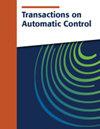Green Routing Game: Pollution-Aware Mixed Fleet Logistics With Shared Charging Facilities
IF 7
1区 计算机科学
Q1 AUTOMATION & CONTROL SYSTEMS
引用次数: 0
Abstract
Eco-friendly freight operations are crucial for decarbonizing the transportation sector. Systematic analysis of policy measures requires a principled modeling approach. While the commonly used model referred to as a routing game considers the congestible nature of transportation facilities, existing models fail to account for environmental factors. This article aims at providing a mathematical framework to study strategic interaction between owners of mixed fleets comprising both internal combustion engine vehicle (ICEV) and electric vehicle (EV) trucks. This study introduces a “green” routing game with incomplete information that models strategic interaction among multiple logistic operators. These players face a pollution tax imposed on ICEVs and a potential delayed delivery cost due to EV charging requirements with uncertainty. In contrast to existing models, this novel model captures the players' tradeoff between lengthier congestion delay at charging stations as the share of EV trucks increases and higher pollution costs with increased ICEV usage, with uncertainty determined by a latent state. We first provide equilibrium characterization and present a condition for essential uniqueness. We show that this equilibrium can be computed in a distributed manner using a gradient projection method. We then introduce a public information system that broadcasts real-time information about the latent state. Importantly, we analyze the value of information for providing a condition for the public information to be beneficial. Finally, we present numerical examples to illustrate settings where environmental taxation and information dissemination can improve social welfare.绿色路线博弈:具有污染意识的混合车队物流与共享充电设施
环保货运业务对运输部门的脱碳至关重要。对政策措施进行系统分析需要有原则的建模方法。常用的路径博弈模型考虑了交通设施的拥挤性,但现有的模型没有考虑到环境因素。本文旨在提供一个数学框架来研究混合车队所有者之间的战略互动,包括内燃机汽车(ICEV)和电动汽车(EV)卡车。本文引入一个不完全信息下的“绿色”路径博弈模型,对多个物流运营商之间的战略互动进行建模。这些参与者面临着对电动汽车征收的污染税,以及由于电动汽车充电要求的不确定性而导致的潜在延迟交付成本。与现有模型相比,该模型考虑了随着电动卡车的增加充电站拥堵延迟时间的延长和电动汽车使用量增加造成的污染成本之间的权衡,其不确定性由潜在状态决定。我们首先给出了平衡表征,并给出了本质唯一性的条件。我们证明了这种平衡可以用梯度投影法以分布的方式计算。然后,我们引入了一个公共信息系统,广播有关潜在状态的实时信息。重要的是,我们分析了信息的价值,为公众信息的有益提供了条件。最后,我们给出了数值例子来说明环境税收和信息传播可以改善社会福利的设置。
本文章由计算机程序翻译,如有差异,请以英文原文为准。
求助全文
约1分钟内获得全文
求助全文
来源期刊

IEEE Transactions on Automatic Control
工程技术-工程:电子与电气
CiteScore
11.30
自引率
5.90%
发文量
824
审稿时长
9 months
期刊介绍:
In the IEEE Transactions on Automatic Control, the IEEE Control Systems Society publishes high-quality papers on the theory, design, and applications of control engineering. Two types of contributions are regularly considered:
1) Papers: Presentation of significant research, development, or application of control concepts.
2) Technical Notes and Correspondence: Brief technical notes, comments on published areas or established control topics, corrections to papers and notes published in the Transactions.
In addition, special papers (tutorials, surveys, and perspectives on the theory and applications of control systems topics) are solicited.
 求助内容:
求助内容: 应助结果提醒方式:
应助结果提醒方式:


